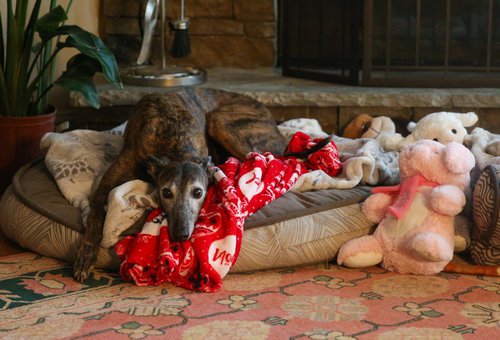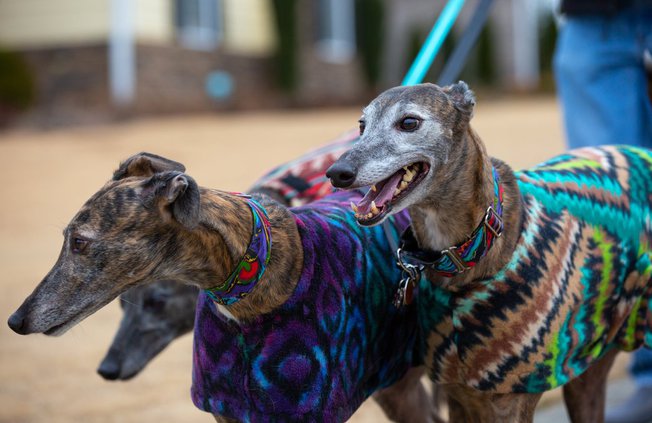Regina Eifler will never have another dog that isn’t a greyhound.
“They’re one of the kindest breeds of dogs I’ve ever known,” said Eifler, who lives on about an acre of fenced-in property in Flowery Branch.
And the truth is she, along with anyone else who wants a greyhound, won’t have much trouble finding one to adopt after Florida voters decided Nov. 6 to phase out greyhound racing in the state by 2021.
Over the years, accusations of greyhounds being mistreated have led to shrinking crowds at races and ultimately the ban in Florida. But Eifler said they’re just that: accusations.

“I know that they’re loved while they’re doing what they’re doing because if they weren’t they would not come into a home and be as kind and gentle as they are,” Eifler said.
But if they’re going to be up for adoption, Eifler is going to adopt them. Right now, she has three of her own that roam around her home, mostly relaxing, being goofy and acting like “couch potatoes.”
“They’re the easiest dog I’ve ever had,” Eifler said. “They’re the biggest dog, but they’re the easiest.”
About ten years ago, she adopted one from Adopt a Greyhound Atlanta in Stone Mountain. Over the years she adopted two more. After the first one, Callie, who’s racing name was Bow Sugar Hill died, she adopted another.
There’s Stella, who’s racing name was Whistler Capri. Eifler said Stella “is our drama queen.” The dog is 8 years old and raced for more than four years. She finished first in three out of four of those races.
Her litter-mate and sister Anna Banana, who’s racing name was Whistler Ants, was the most successful racer of all her dogs, finishing first in almost 90 percent of her races over five years.
Lastly, there’s Frieda, who’s racing name was T’s Fire Eater. She was successful in 80 percent of her races over more than three years, but she had to stop racing a little earlier than the others.
“She ran to some children that were standing there (at the track), so they decided she didn’t want to race anymore,” Eifler said. “Once they become love bugs, you can’t make them keep going.”
Eifler said she always remembers wanting a greyhound. She was young, about 9 years old, when her mother took her to craft shows. She said there were usually greyhound adoption groups there and one person always walked around with a greyhound on a leash.
“I always thought they were amazing-looking dogs,” Eifler said. I always wanted one, but I didn’t get one until I was like in my 40s.”
With her first adoption, she was sold on the breed. Even though she opposed the ban in Florida, she said she will always adopt greyhounds now. And even though hers no longer race, she said those natural instincts sometimes come out since they were trained to race from such a young age.
“They stand in line in the morning to go outside, and it’s always their noses are down like they’re coming out of their little box,” Eifler said. “They run down and they run around the yard counter-clockwise a few times and run and play and go do their business. Then they come back up and they don’t even care again until 4 or 5 hours.”
There’s always the little reminder of their racing days, and it doesn’t have anything to do with counter-clockwise laps around the yard: Each dog is tattooed inside its ear just after it’s born, so it’s identifiable throughout its career.

Kelsey Bishop, who lives in Gainesville, adopted a greyhound in 2015. Although she doesn’t feel the same about racing as Eifler, she found that her greyhound, Fitz, had the same sort of personality as Eifler’s.
“He was great,” Bishop said. “You’d think they’d be high energy because they’re racing dogs, but I don’t know if it’s because they’re burnt out … but he was just very chill. He just sat on the couch. You would have to ask him to get up.”
Bishop, a foster parent, said it was important for her family to adopt a dog instead of getting one from a breeder. Even though she had to return the dog because she moved to a different home that didn’t allow him, Bishop said she’ll always adopt.
“There’s tons of dogs out there that need a life and they need love just like a purebred dog,” Bishop said. “For us, it was just important that we rescued a dog instead.”
And that’s where Bishop and Eifler agree.
“I cannot see ever, ever, ever spending the amount of money people spend on puppies from breeders,” Eifler said. “I don’t care what kind of dog it is when there are so many dogs that need homes.”
That’s what gets people like Carl Viener, director and founder of Adopt a Greyhound Atlanta, out of bed in the morning. Like Eifler, Viener isn’t happy about the greyhound racing ban, but if those greyhounds that will be out of a job need a place to find a new home, Viener will be there.
In 1981, he found a stray greyhound and the rest is history. Back then, Viener said there was a big need for homes for greyhounds. If he was asked about his feelings on greyhound racing then, he said he would have been against it.
“I kind of evolved slowly until I realized I wasn’t that against it anymore,” Viener said.
He said the way greyhounds are taken care of nowadays is much different and the ones who support the ban in Florida are still thinking it’s like it was years ago.
The need for an adoption agency is creeping back up now, though, as greyhound racing slowly disappears in Florida. Viener said he’s gotten 60 adoption applications since the vote in November.
That’s where Eifler got her dogs, and she said she’ll never turn back.
“Greyhounds are our breed and they’ll always be our breed,” Eifler said. “Anybody that gets a greyhound would be so lucky.”
The Associated Press contributed to this story.

